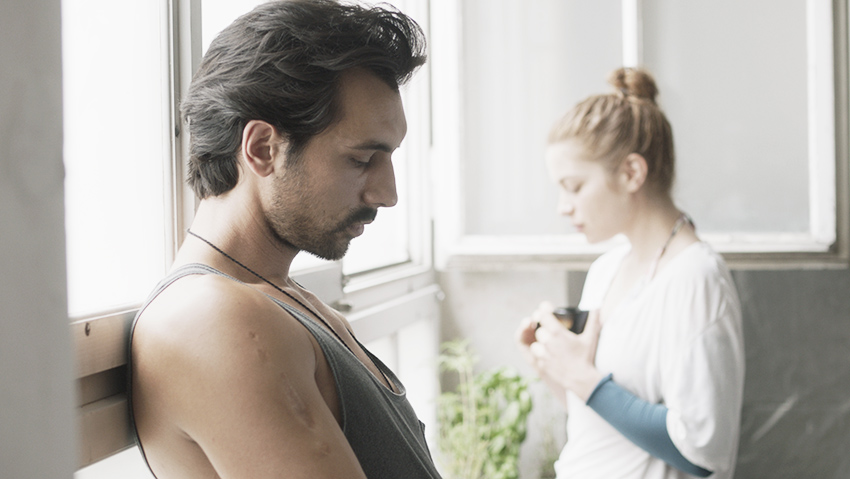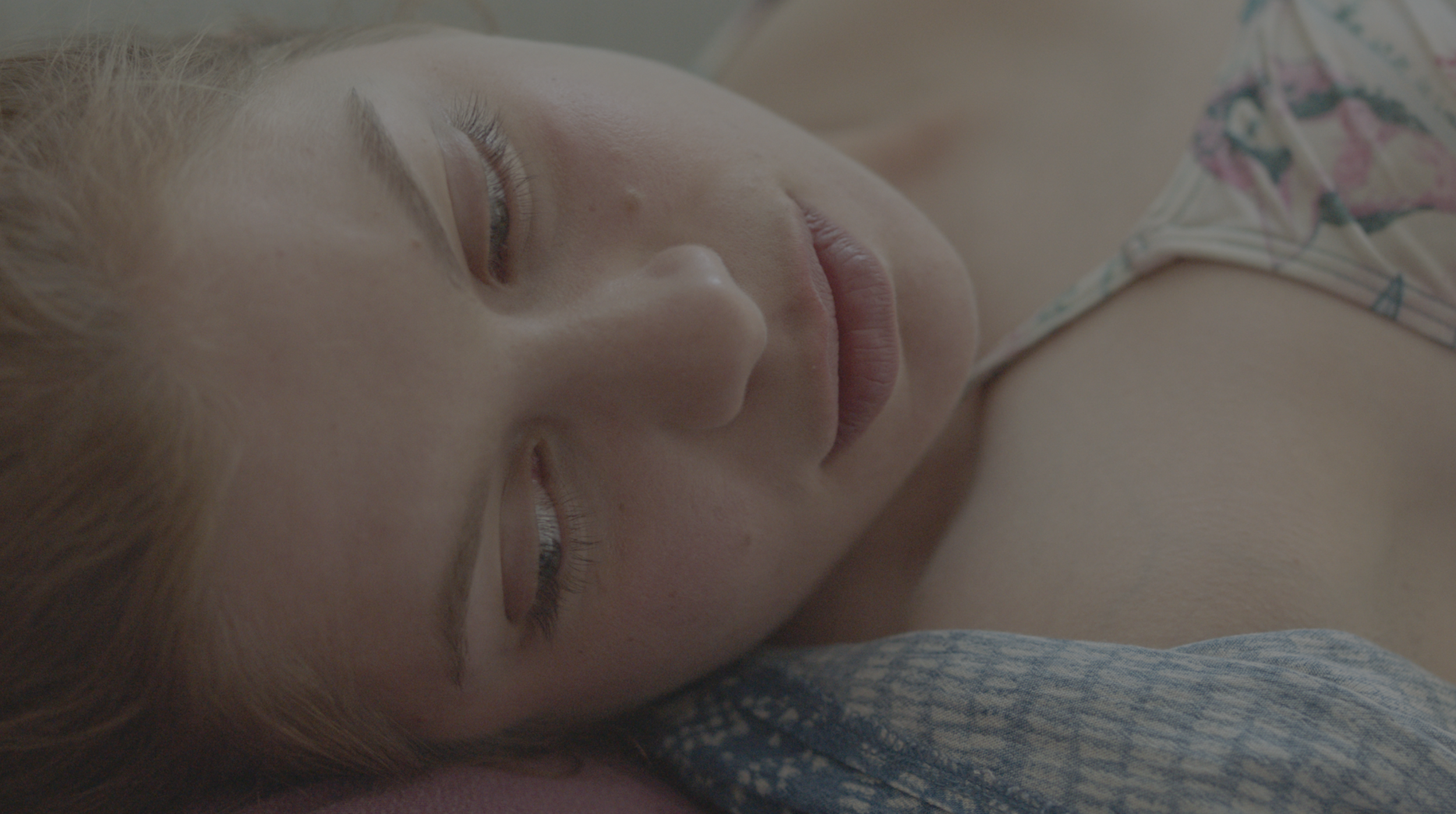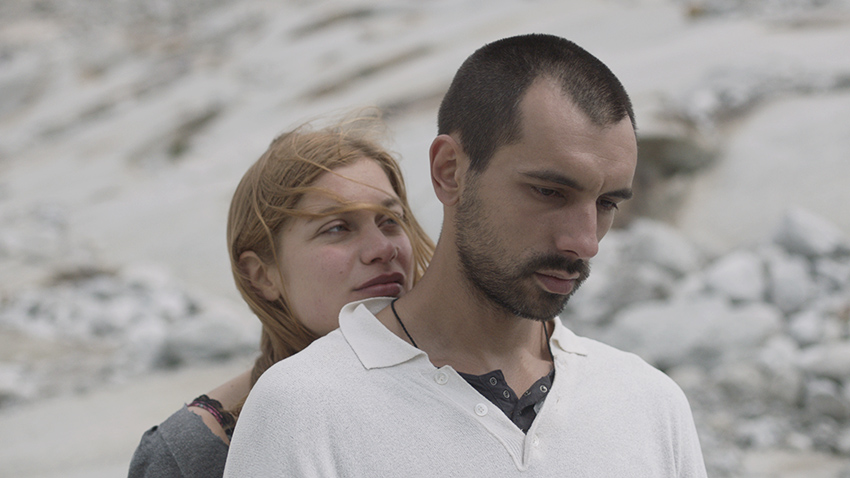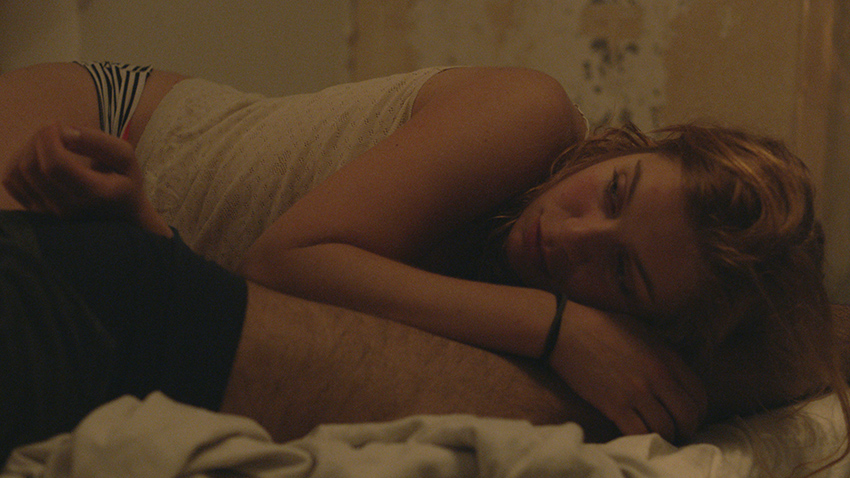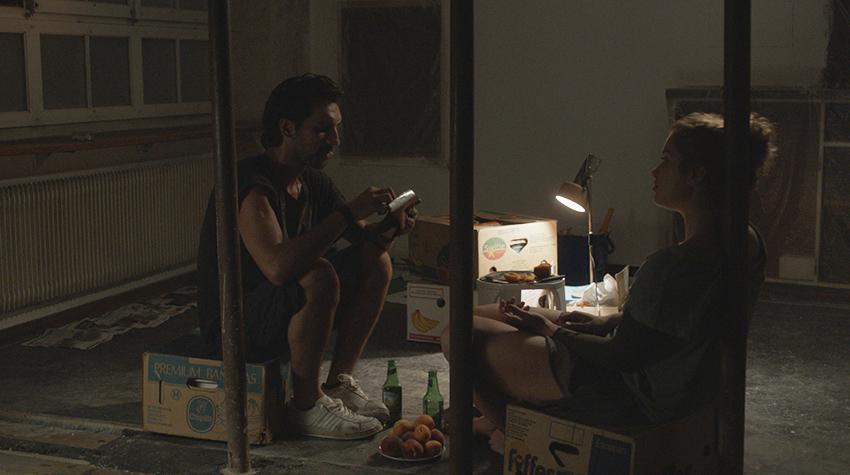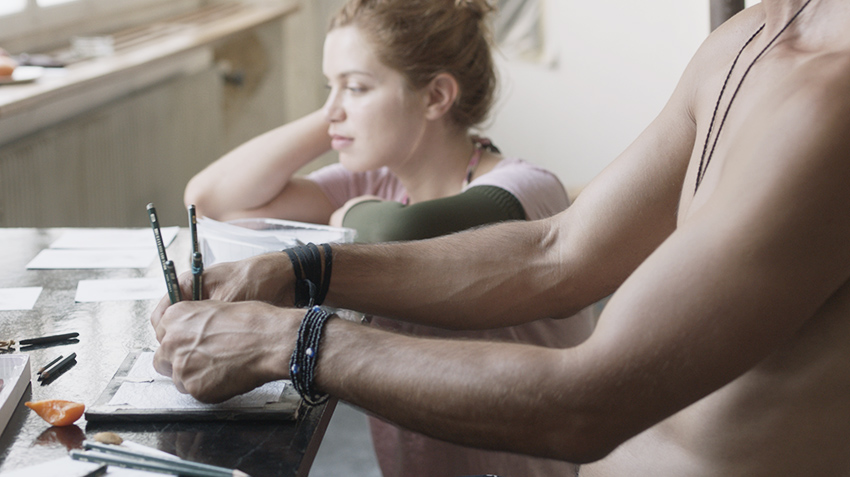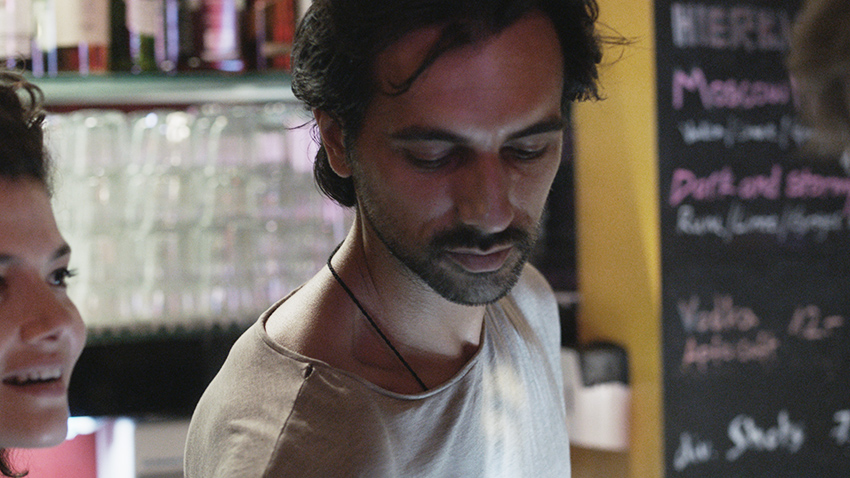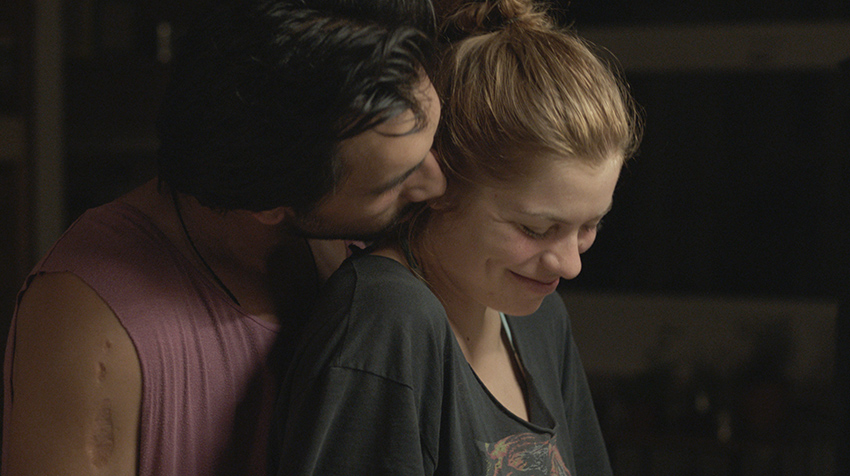


SKIZZEN VON LOU
Sketches of Lou
A FILM BY LISA BLATTER
SKIZZEN VON LOU
Sketches of Lou
A FILM BY LISA BLATTER
Lou und Aro begegnen sich, berühren sich – alles unverbindlich. Doch bald kommen sie sich näher, als sie es je zugeben würden. Auf der Suche nach der ultimativen Freiheit leugnen sie ihr Bedürfnis nach Familie. – Ein subtiles, feinfühliges Portrait einer Generation, die Angst vor der Liebe hat.
Lou meets Aro, they connect - refusing to commit, they get closer than they would ever admit. Seeking for freedom they deny their need for family. - A subtle and tender portrait of a generation that is afraid of love.
Trailer
Trailer

Synopsis
Synopsis
Lou (29) is a present-day nomad. Forever in search of the ultimate kind of freedom, she’s long ago blocked out what it is she is actually running from. At home everywhere and nowhere. Living a now-now life. Click and - next, please. Until she meets Aro (35) and Aro is different. Even if he preaches the same sermon: Just make sure not to define the status of the relationship you’re in and enjoy the summer while it lasts, not committing to anything.
And yet, without looking for it, they get under each other’s skin. Now there are expectations, jealousy nags and contradicts their frantic pursuit of independence. All of a sudden, Lou does not know anymore what it is all about. Where does she come from? Where does she belong?
With her film „Skizzen von Lou“ (Sketches by Lou), Lisa Blatter dares looking underneath the veneer of the young and fast-paced Zurich. In her quiet film, she offers a very detailed observation as well as critique of her generation’s superficial longing for freedom. It’s a story about loneliness, home and family.
Lou (29) ist eine moderne Nomadin. Immer auf der Jagd nach Freiheit und Ungebundenheit, hat sie längst verdrängt, wovor sie eigentlich davonläuft. Überall und nirgends zu Hause, lebt sie ein Instant-Leben. Klick und Next, please. Bis sie Aro (35) trifft, und Aro ist anders. Auch wenn er wie sie predigt: Bloss keinen Beziehungsstatus definieren, den Sommer geniessen, sich auf nichts und niemanden einlassen.
Die Begegnung mit Aro geht Lou voll unter die Haut. Ohne dass sie es merkt, sind da auf einmal Erwartungen und Eifersucht, Gefühle, die ihrem krampfhaften Streben nach Unabhängigkeit widersprechen. Und plötzlich weiss Lou nicht mehr, was das alles soll. Woher sie kommt. Wohin sie eigentlich gehört.
Mit «Skizzen von Lou» wirft Lisa Blatter einen Blick hinter die Fassade des jungen, schnelllebigen Zürich. In ihrem ruhigen, poetisch erzählten Film setzt sie sich in präziser Beobachtung mit dem Freiheitsdrang ihrer Generation auseinander. Eine Geschichte über Zugehörigkeit. Über Einsamkeit und Familie
DIRECTOR’s STATEMENT
One question I keep coming back to is whether our society’s search for freedom has become so overwhelming it’s turned into a paralyzing force. Whatever we do, we can do out of our own free will – without being restricted by economic restraints in the struggle for survival. We’re prisoners caught in the rat race of individualized affluence and the projection of freedom. True masters of repression, we run, as soon as we run the risk of getting to know ourselves – in reality as well as in the figurative sense. However, we all get to the point where we are lonely, in a void, waiting – but for what? We are so busy with our self-fulfillment, we forget to stand still, take a breath and think of what happiness actually is made of: love maybe, family and solidarity?
With my film, I ask whether love has the power to unravel everything. The deeper the relationship between Aro and Lou becomes, the more they let this happen, the more they realize how lonely their lives are and ultimately, how scared they are of their lives. This war-of-attrition back and forth - that I’m sure we all know from our own love lives - is what fascinates me. To me, this is a fight for belonging and letting happen. I understand love to be a trigger of the desire for wanting to let go of old patterns. Love is caring for another, irrespective of one’s much feared flaws, regardless of the price tag attached. Even running from love will lead us back to our deepest traumas, to overcome which somehow remains a goal in life – in the end, it’s all about coming home.
Eine Frage, die ich mir immer wieder stelle ist, ob in unserer Gesellschaft der Freiheitsdrang so umfassend geworden ist, dass er letztlich paralysiert? Alles was wir tun, können wir aus freiem Willen tun – ohne durch wirtschaftliche Zwänge an den Überlebenskampf gebunden zu sein. Wir sind im Hamsterrad des individualisierten Wohlstandes und der Projektion von Freiheit gefangen. Als Meister der Verdrängung suchen wir, sobald es darum geht unser Selbst kennen zu lernen, das Weite – im realen wie im übertragenen Sinne. Doch irgendwann offenbart sich doch Einsamkeit, eine Leere, ein Warten... nur auf was? Wir sind so fleissig damit beschäftigt, uns selber zu verwirklichen, dass wir vergessen inne zu halten, durchzuatmen und uns zu besinnen, was Glück bedeutet; vielleicht Liebe, Familie und Gemeinschaft?
In meinem Film setze ich mich mit der Frage auseinander, ob Liebe alles ins Wanken bringen kann. Je tiefer die Verbindung zwischen Aro und Lou wird, je mehr sie zulassen, desto mehr wird ihnen die Einsamkeit und letztlich die Angst vor ihrem Leben bewusst. Dieses zermürbende Hin und Her, das wir sicherlich alle in Liebesbeziehungen erleben, hat mich interessiert. Es ist für mich ein Kampf um Zugehörigkeit und Zulassen. Liebe ist für mich der Auslöser, sich von alten Schematas abwenden zu wollen. Liebe, das ist die Zuwendung eines Menschen jenseits der eigenen, so sehr gefürchteten Fehler – gleichgültig um welchen Preis. Selbst die Flucht vor der Liebe führt uns zurück zu unseren tiefsten Verletzungen, die zu durchbrechen irgendwie ein Ziel des Lebens ist – Ankommen eben.
CAST & CREW
Lou
LILIANE AMUAT
Aro
DASHMIR RISTEMI
and
Noëmi Steffen, Hans-Jakob Mühlethaler, Sasha Obratov, Ernst C. Sigrist,
Katerina Stoykova, Milka Soskic, Gezim Ristemi, Elham Ristemi, Michel Kiwic and Yaga
CREW
Author & Director
LISA BLATTER
Cinematography
GAËTAN VARONE
Licht / Kamera-Assistenz
NICOLAI WOLF
Original sound
MARKUS EGLOFF
Art direction
MIRJAM ZIMMERMANN
VALERIA FELDER
Costume design
VALENTINA VUJOVIĆ
Hair & Make-up
MARINA AEBI
Montage
MYRIAM FLURY
Original score
HANS-JAKOB MÜHLETHALER
Sound design
MAURIZIUS STAERKLE DRUX
Artwork
STUDIO NICOLAS SCHALTEGGER
Producer Development
JAN GASSMANN
Producers
JULIA TAL
RHEA PLANGG
LISA BLATTER
TECH SPECS
Genre
FICTION
Duration
82 min
Shooting Format
ARRI AMIRA HD 1:1,85
Screening Format
DCP
Sound
DOLBY DIGITAL 5.1
Language
Swiss german
Subtitles
English, French
About
About
Fimography — Lisa blatter
2016
Skizzen von Lou (Sketches of Lou)
fiction, appr. 80’ , script, director
2015
Heimatland (Wonderland)
omnibus film, 99’ , director (one episode)
2008
Nachglühen (Afterglow)
fiction, 15’; script, director
2007
Traurige Jungs tanzen, wenn niemand hinsieht
(Sad boys dance when no one’s watching)
fiction, 16’; script, co-director
2007
Hotel 7.4
fiction, 9’, script, director
2006
A normal dog and shit like that
fiction, 16’; script, co-director
2005
Pool
fiction, 4’; script, co-director
Lisa Blatter (1979) was born as the daughter of the author Silvio Blatter and the artist Mona Blatter in Heide (D) and grew up in Zurich. She attended High School in Stadelhofen and worked part-time as a journalist for TA-Media and Ringier. Again and again she spent several months on journeys. The roadtrips led her across the USA, to Japan and the Balkans. She learned the craft of filmmaking at the ZhdK, where she studied from 2002 to 2008. The short films, TRAURIGE JUNGS TANZEN, WENN NIEMAND HINSIEHT and NACHGLÜHEN which were produced during her studies, were shown successfully at numerous festivals, the latter was also shown at the LOCARNO FILM FESTIVAL 2008. NACHGLÜHEN was nominated for the German Junior Award by First Steps in 2008. In cooperation with Jan Gassmann and Julia Tal, she founded the production company 2:1 Film GmbH in 2010. The omnibus film HEIMATLAND in which Lisa took part as a director, premiered at the LOCARNO FILM FESTIVAL 2015 and is currently distributed in Swiss and French cinemas.


